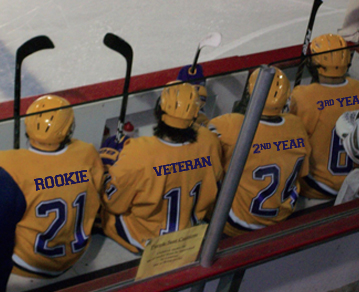How Soon Is Too Soon: When Should You Play Your Rookies?

 Each year, coaches at every level of every sport across the country are faced with the exact same question: When do I play my rookies?
Each year, coaches at every level of every sport across the country are faced with the exact same question: When do I play my rookies?
Whether the players are highly-touted prospects along the lines of Patrik Stefan — no. 1 pick in the 1999 NHL Draft — or draft afterthoughts like Martin St. Louis — not picked during the 1998 NHL Draft — the answer may make or break their careers. And your season.
The tales of rookies being pushed into action way too soon only to flounder, lose all confidence and slowly end up benched and worse are endless. It isn’t all that often we see rookies flourish immediately, like an Andrew Luck or a Russell Wilson. But for every Luck and Wilson there are a hundred Ryan Leafs, JaMarcus Russells and Brady Quinns.
Of course, the opposite is also true. Oftentimes, talented rookies never really get a shot, as they are stuck behind established starters, suffer injuries that set them back early or are simply held back due to lack of experience. Some wait their turn and become stars later in their career, such as Aaron Rodgers, but a lot end their careers without ever making an impact on the field, court or ice.
Would these athletes have had the same success or failure if they had been put in the opposite situation? Is there a formula for success? It’s hard to say. For the majority of athletes, their success and failure is largely made up of opportunity; are they in the right scheme, surrounded by the right players and supported by the right coaching staff?
In a vacuum, there is no guideline for how and when to play your rookies. But there may be certain attributes your young players may have that help make your decision to play them much easier.
Does the player have physical talent?
This is a no brainer. But just because an athlete showed talent at a previous level, doesn’t fully guarantee that talent is going to translate to the next step. Again, unprecedented talent like Andrew Luck is easily translated to the next level, but a college standout like Tim Tebow, who was talented by unconventional means, is much tougher to judge.
If you have a rookie who is particularly gifted and it shows consistently during practice, chances are you may be safe to give them playing time. A player who only shows flashes now and then is a much bigger risk.
Does the player have the right mental attitude?
As much as talent matters, having the right mental attitude may be even more important. And that applies no matter how experienced the player may be. But there are two specific things you must look for in young players: are they mentally mature and are they mentally tough?
Maturity is simple. Within the first few weeks of being with a player, you should be able to get a sense of whether they’ll let playing as a rookie “go to their head.” Consider the recent sensational rookie seasons of Mike Trout and Yasiel Puig. While it’s safe to say that both players deserved the success and accolades that came to them, it’s safer to say that Puig handled his instant celebrity a little less smoothly than Trout did.
And a player doesn’t ultimately need to be successful to show their maturity; which leads to mental toughness or the ability to bounce back when things aren’t going well. Every rookie, no matter how well their season is going, eventually hits a “rookie wall;” a stretch of play where they show growing pains. How they respond speaks volumes about their character and their ability to play at the highest levels.
Does the player have a good work ethic?
A natural extension of a good mental attitude is a good work ethic. Players, whether inexperienced rookies or hardened veterans, must be willing to continuously work hard to develop, never resting on their laurels.
Players who haven’t achieved anything should never have an “I already made it” attitude, but some rookies do. When you have a young player who is unceremoniously hitting the weight room, studying film and getting in extra reps after practice on a regular basis, you likely have the makings of a trusted team leader.
Get that athlete some playing time!
When should you play your rookies? If they have the talent, mental makeup and work ethic to play at the next level, there’s no reason to keep ‘em waiting.






